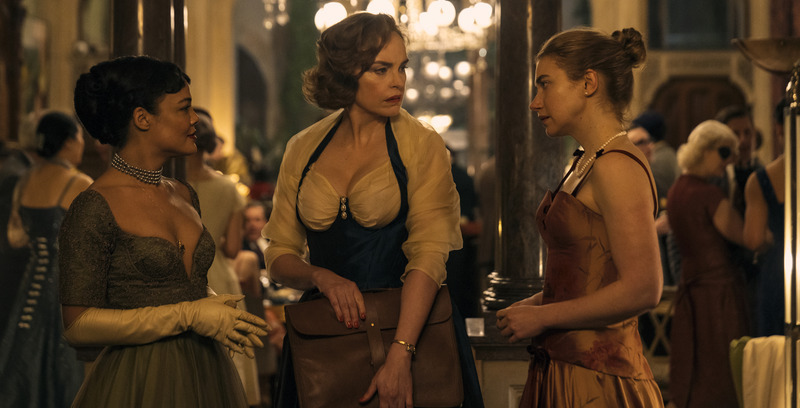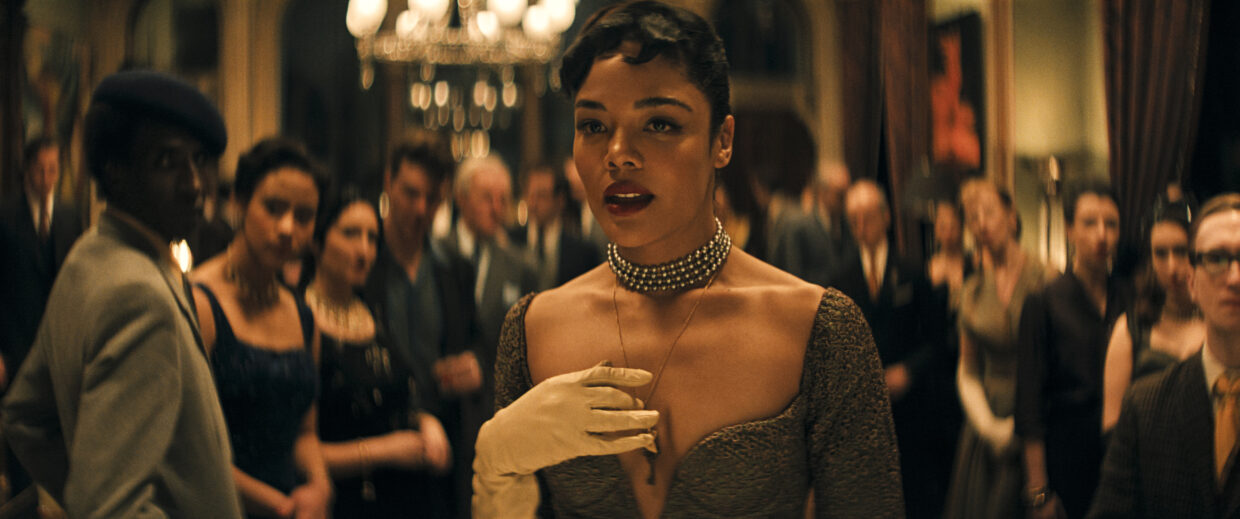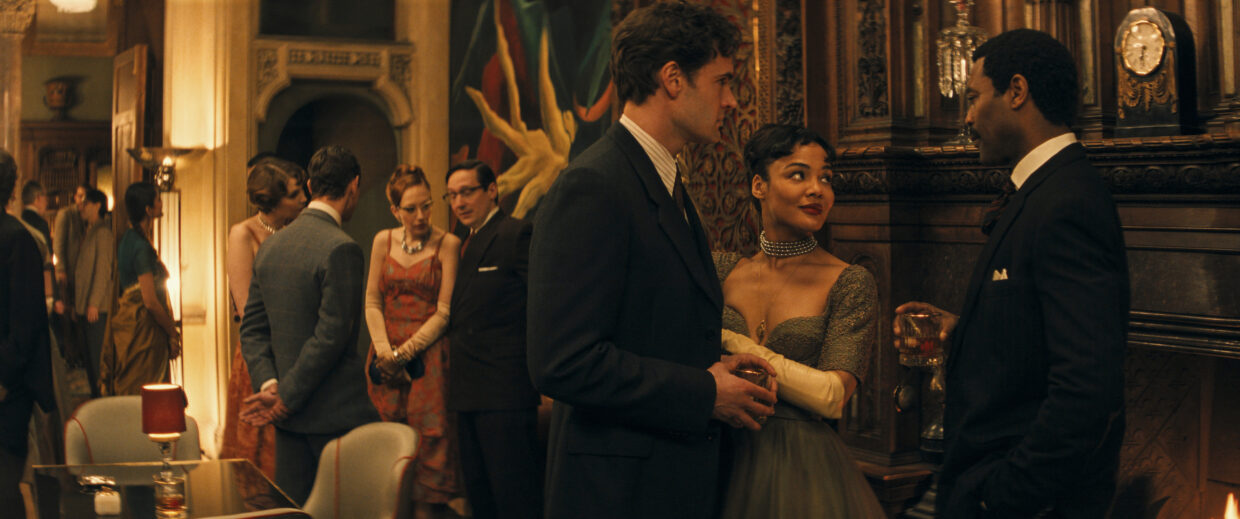
What Hedda Reveals About the Timelessness of Feminine Rage
Hannah Bonner Talks to Director Nia DaCosta About Her Cinematic Adaptation of Henrik Ibsen’s Play
In Nia DaCosta’s vespertine parlor drama Hedda, an adaptation of Henrik Ibsen’s 1890 play Hedda Gabler, Tessa Thompson transfixes in the titular role. The film takes place in 1954 almost exclusively over the course of one evening at a party thrown by the newly wed Hedda who wields literal and figurative weapons for her own personal amusement and potential financial gain. Almost serpentine in her shimmering elegance, Thompson’s Hedda glides from room to room wreaking social havoc with her guests, an old lover, and even her husband that will, ultimately, have tragic consequences for all.
Yet, while Hedda is decidedly not a hero, DaCosta also refuses to paint her as a villain. “I just sort of do things, all of a sudden, on a whim,” she admits, halfway through the film. “I don’t know why.” In DaCosta’s world, a woman acting badly is met with neither judgement nor pathology, but unflinching curiosity. To wit, at times the camera tracks Hedda’s movements in long, unbroken takes as if engaged in an endless, ongoing search for her motivations—and interiority. With toney interiors and Icelandic composer Hildur Guðnadóttir’s pulsating percussive soundtrack, DaCosta’s adaptation feels at once like a period piece as well as a fresh, psychological thriller about power and class. A month before the film’s theatrical release, I spoke with DaCosta about rage, love, and the ever-elusive, if intriguing, character Hedda Gabler.
*
Hannah Bonner: How would you describe your writing process? What’s your entry point into a screenplay?

Nia DaCosta: I love an outline. I like, when I come to the actual script, knowing scene by scene exactly what I’m doing. Outlines are so helpful because you can keep revisiting them and adding to them. I approach everything from character so even if I come up with a concept first, I always want to make sure that, whatever the greater idea, there’s a character in the middle of it who has motivations that make sense, who can pull a story that we care about—so I build that into my outline that then becomes the script. I’m very linear in my process.
HB: What specifically drew you to adapting Ibsen’s play?
NDC: Hedda’s just such a fascinating character. She’s so dynamic and enigmatic. I think the fact that she’s such an enigma, that she’s a character people have been trying to figure out for the past one hundred and thirty years, was really appealing to me. We can each interpret Hedda in a different way. I really want to shine a light through one of her many prisms. The way Ibsen writes women I also find fascinating. You can tell that he lived in a world where he was like, I don’t think women are ok. I feel like they have a lot more dimension than they’re allowed to show, and I want to explore that.
HB: In Ibsen’s play Hedda has a refrain that she’s “bored.” What do you feel activates Hedda in your adaptation? Because her motivations seem much more complicated than mere boredom in your adaptation.
NDC: Tessa [Thompson] puts this a great way, Hedda’s dying to live. And Hedda really wants to be loved. But she’s too scared to be vulnerable enough to be loved and seen. She gets close with some people, but they’re often the ones she hurts the most. What animates her is this rage, frankly, at the box society puts her in as well as the box she puts herself in. In the context of the film, as soon as she feels something she acts. And that impulse gets her into a lot of trouble, it gets the people around her into a lot of trouble. She’s always acting on her whim. But I do think that her inability to be loved is her central conflict and because it’s so existential, internal, and mercurial. It’s tortuous.
The desire for power is this animal urge inside us, and if we were more capable to engage in our fallibility because we are animals I think we would probably be in a better place.
HB: What performances or films did you suggest Tessa Thompson watch when preparing for this role? Having worked together previously on Little Woods (2018), what does your collaboration process look like?
NDC: I don’t really like using films as a reference visually. When I sent Hedda to my agent, she was like, have you seen Thomas Vinterberg’s Festen (1998)? After I watched Vinterberg’s film I realized it was similar in nature to Hedda because it’s one weekend party in which someone decides they’re going to tell the truth and everything devolves from there. It’s really amazing.
But ultimately I wanted this adaptation to live on its own merit. Nina [Hoss] puts it really well, she says, this Løvborg is such a different character. Not just because of gender, but also because of the ultimate endpoint for that character. So I really wanted the actors to have the script as gospel.
HB: Though Little Woods (2018), Candyman (2021), and Hedda (2025) are very different stylistically, all three are deeply invested in concerns of class which feels very prescient for our present moment. What other themes or topics in Hedda feel timely to you right now?
NDC: I made Little Woods when the hardest place to get an abortion in America was this northwest corner of North Dakota and, at the time, thinking Hillary Clinton will be President and this film will no longer be relevant. To be now in a time when Roe v. Wade has been overturned is so wild to me.
I think a lot about how we are all just animals at the end of the day. And we happen to be self-aware and we happen to have moments of rationality, but we are emotional creatures who, if we are lucky, try to understand ourselves, try to do better. Not just for ourselves but for our children and our children’s children. For our communities. And I think a lot of what we forget is love, pursuing love, loving ourselves, loving each other is the most important thing we can do. But often what we are trying to pursue isn’t love, it’s power.

All these central characters in Hedda are grasping for power because they want to be free. But power is not where freedom comes from. The desire for power is this animal urge inside us, and if we were more capable to engage in our fallibility because we are animals I think we would probably be in a better place.
HB: I saw an interview with you and Tessa Thompson at TIFF where you said you were always a writer—a poet, a novelist—until you moved to Harlem and started watching more films and television on HBO. What are the books or plays you return to over and over for inspiration as a director and screenwriter?
NDC: I revisit Jane Austen a lot. She’s really brilliant—speaking of class and social mores. So much of her work is about love transcending class, not in a cheesy way, but precisely because of the importance of that transcendence. Aristotle’ s Poetics is something I also revisited a lot in the past as a base text. I love ancient world storytelling—it’s so foundational.
__________________________________
This conversation is presented in partnership with the 4th annual Refocus Film Festival, a four-day celebration of the art of adaptation and hosted by Iowa City’s nonprofit cinema, FilmScene. Refocus Film Festival will take place in Iowa City October 9-12, 2025. Passes are on sale now.
Hannah Bonner
Hannah Bonner is the author of Another Woman (EastOver Press 2024). Her writing has appeared in BOMB, Cleveland Review of Books, Literary Hub, the Los Angeles Review of Books, and The Sewanee Review, among others. She lives in Philadelphia.



















